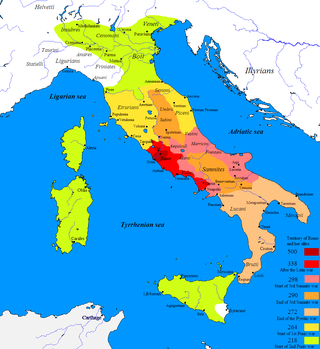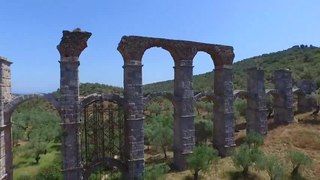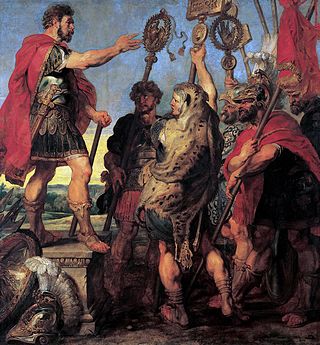Related Research Articles
During the 290s BC, Hellenistic civilization begins its emergence throughout the successor states of the former Argead Macedonian Empire of Alexander the Great, resulting in the diffusion of Greek culture throughout the Levant and advances in science, mathematics, philosophy, etc. Meanwhile, the Roman Republic is embroiled in war against the Samnites, the Mauryan Empire continues to thrive in Ancient India, and the Kingdom of Qin in Ancient China, the one which in the future will conquer its adversaries and unite China, begins to emerge as a significant power during the Warring States period.

The First, Second, and Third Samnite Wars were fought between the Roman Republic and the Samnites, who lived on a stretch of the Apennine Mountains south of Rome and north of the Lucanian tribe.
Sextus Julius Frontinus was a prominent Roman civil engineer, author, soldier and senator of the late 1st century AD. He was a successful general under Domitian, commanding forces in Roman Britain, and on the Rhine and Danube frontiers. A novus homo, he was consul three times. Frontinus ably discharged several important administrative duties for Nerva and Trajan. However, he is best known to the post-Classical world as an author of technical treatises, especially De aquaeductu, dealing with the aqueducts of Rome.

Manius Curius Dentatus was a Roman general and statesman noted for ending the Samnite War and for his military exploits during the Pyrrhic War. According to Pliny, he was born with teeth, thus earning the surname Dentatus, "toothed."
Quintus Fabius Maximus Rullianus, son of Marcus Fabius Ambustus, of the patrician Fabii of ancient Rome, was five times consul and a hero of the Samnite Wars. He was brother to Marcus Fabius Ambustus.
The gens Papiria was a patrician family at ancient Rome. According to tradition, the Papirii had already achieved prominence in the time of the kings, and the first Rex Sacrorum and Pontifex Maximus of the Republic were members of this gens. Lucius Papirius Mugillanus was the first of the Papirii to obtain the consulship in 444 BC. The patrician members of the family regularly occupied the highest offices of the Roman state down to the time of the Punic Wars. Their most famous member was Lucius Papirius Cursor, five times consul between 326 and 313 BC, who earned three triumphs during the Samnite Wars. Most of the Papirii who held office under the later Republic belonged to various plebeian branches of the family. Although the most illustrious Papirii flourished in the time of the Republic, a number of the family continued to hold high office during the first two centuries of the Empire.

Lucius Papirius Cursor was a celebrated politician and general of the early Roman Republic, who was five times consul, three times magister equitum, and twice dictator. He was the most important Roman commander during the Second Samnite War, during which he received three triumphs.
Gaius Maenius was a Roman statesman and general who was elected consul in 338 BC and appointed dictator twice, in 320 BC and 314 BC.

The Aqua Appia was the first Roman aqueduct, constructed in 312 BC by the co-censors Gaius Plautius Venox and Appius Claudius Caecus, the same Roman censor who also built the important Via Appia.

The Romans constructed aqueducts throughout their Republic and later Empire, to bring water from outside sources into cities and towns. Aqueduct water supplied public baths, latrines, fountains, and private households; it also supported mining operations, milling, farms, and gardens.

Publius Decius Mus, of the plebeian gens Decia, was a Roman consul in the years 312 BC, 308 BC, 297 BC and 295 BC. He was a member of a family that was renowned for sacrificing themselves on the battlefield for Rome.

The Aqua Tepula is an ancient Roman aqueduct completed in 125 BC by censors Gnaeus Servilius Caepio, who had served as consul in 141 BC, and Lucius Cassius Longinus Ravilla.
Spurius Carvilius C. f. C. n., later surnamed Maximus, was the first member of the plebeian gens Carvilia to obtain the consulship, which he held in 293 BC, and again in 272 BC.
The gens Cominia was a minor plebeian family at ancient Rome, which appears in history from the Republic to imperial times. The first of this gens to hold the consulship was Postumus Cominius Auruncus in 501 BC, and from this some scholars have inferred that the Cominii were originally patrician; but all of the later Cominii known to history were plebeians.

Quintus Marcius Rex was a Roman politician of the Marcii Reges, a patrician family of gens Marcia, who claimed royal descent from the Roman King Ancus Marcius. He was a paternal great-grandfather of Julius Caesar.
Lucius Papirius Crassus was a Roman politician. He was appointed dictator in 340 BC, and consul in 336 BC and 330 BC. Lucius Papirius was from the Papiria gens (family) in Rome.
Servius Cornelius Maluginensis was a politician and general of the Roman Republic. He was elected consular tribune seven times in 386, 384, 382, 380, 376, 370, and 368 BC. Despite having one of the most successful careers of the Republic, Servius' life is seldom known.
Lucius Papirius Crassus was a consul of the Roman republic in 436 BC and possibly a censor in 430 BC.
Lucius Papirius Mugillanus was a consul of the Roman Republic in 427 BC, consular tribune in 422 BC and censor in 418 BC.
Lucius Papirius Cursor was a 3rd century BC Roman politician, elected consul twice. A grandson of Lucius Papirius Cursor, his brother Lucius Papirius Praetextatus became censor in 272 BC.
References
- ↑ Frontinus, The Aqueducts of the City of Rome, Book I, 6
- ↑ "Catalogue entry".